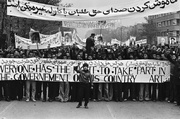“The coronavirus outbreak has caused fuel demand to drop drastically, which has also led to the slump of prices this year,” Zanganeh said on Wednesday on the sidelines of the weekly cabinet meeting.
He noted that based on the previous estimations, OPEC had put the oil demand for this year’s second quarter at 14 million barrels per day, however, due to the coronavirus pandemic, the market demand now revolves around three million bpd.
Reiterating that OPEC will not be able to handle the situation alone, Zanganeh urged other producers, including the Shale oil producers, to shoulder their responsibilities toward the global challenge to help pass through the crisis.
He referred to the historic plunge of WTI and OPEC basket prices, and also the producers’ running out of storage capacity, stressing that should the OPEC and non-OPEC players in the market not cooperate, the situation will definitely worsen.
Oil prices slumped again on Wednesday, with Brent falling to the lowest since 1999, as the market struggled with a massive crude glut amid a collapse in demand for everything from gasoline to jet fuel caused by the coronavirus outbreak.
Brent crude LCOc1, which fell 24% in the previous session, touched $15.98 a barrel, its lowest since June 1999.
West Texas Intermediate CLc1 was down 51 cents, or 4.4%, at $11.06 a barrel.
The falls follow two of the wildest days in the history of oil trading, as worldwide supply looks set to overwhelm demand for months to come and current production cuts fall far short of offsetting that glut.
Oil prices have slumped by around 80% this year as the pandemic has spread across the world, killing almost 180,000 people, routing financial markets and leading to what could be the worst economic meltdown since the depression of the 1930s.
The viral outbreak has caused fuel demand to drop by roughly 30% worldwide and energy companies in the United States, the world’s biggest producer, are scrambling to find storage for excess oil.
MNA/4907002


























Your Comment